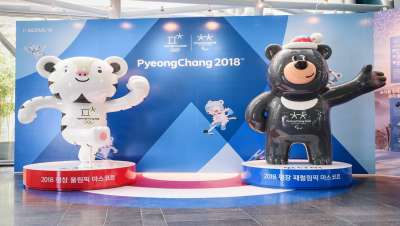Winter Olympics 2018: PyeongChang Preview
What to expect at the 2018 Winter Olympic Games
PyeongChang, South Korea is set to host the 2018 Winter Olympics Feb. 9–25, followed by the Paralympic Games from March 9–18.
Extreme Games
Cities, governments, mayors, and presidents vie for the honor to host the Olympic Games, betting that investing huge sums in infrastructure and event-specific development will payoff in terms of tourist revenue, positive publicity, and sustained growth and income. PyeongChang has spent a reported $12.9 billion on preparations for the Games, exceeding their predicated costs by $7 billion. The high cost is accompanied by high hopes that the Olympics will bring much needed attention and tourism to one of South Korea's poorest areas.
Torch Relay
The torch of the Winter Games is gold and white, matching the colors of the PyeongChang 2018 Olympic Winter Games Torch Relay. The length of the torch, 700mm, represents the altitude of the city, and the five-pronged shape of the flame mirrors the Korean symbol for PyeongChang. The torch is also designed in such a way that the flame will continue to burn regardless of weather conditions. Two of South Korea's gold medallists, Yuna Kim and Magnus Kim, revealed the Olympic Torch on February 9, 2017 at the Gangneung Ice Hockey Center.
The Torch Relay itself began on October 24, 2017 and lasted for 101 days. The journey began with the lighting of the torch in Olympia, Greece, and the following week, it began it's Korean journey on November 1. There are 7,500 runners to represent the 75 million people who call the Korean peninsula home. Transport of the torch continues to be diverse and exciting, traveling via a sailboat, steam train, zip-wire, cable car, robot, and yacht. City celebrations also follow the torch on its journey.
Meet the Mascot
The mascot of the PyeongChang 2018 Winter Olympic Games, Soohorang, is an adaptation of the white tiger. Korea chose the white tiger because it has long been considered the country's guardian animal. "Sooho" is the Korean word for protection, and "rang" is the middle letter of the Korean word for tiger. The mascot acts as a protector and friend to all those participating in and enjoying the Olympic Games.
Cold Wave Hits
The past two Winter Olympics were reported to be too warm, but PyeongChang will most likely silent those complaints. This year, the Olympic Games may set a record for the coldest Games since those held in Norway in 1994. The stadium, which will have 35,000 spectators, is expected to experience a wind chill of seven degrees Fahrenheit. The biting winds have been known to give concertgoers in PyeongChang hypothermia. In an attempt to keep people warm, Olympic organizers will be providing heating pads, blankets, and raincoats, as well as the message for spectators to bundle up. Only time will tell if PyeongChang's infamous cold will beat Norway's Olympic record of twelve degrees Fahrenheit.
Political Unrest
Six years ago, when South Korea won the bid for the Olympics, there were high hopes for the country; however, a year before the Games were to begin, political unrest reared its ugly head. As protesters filled the streets, Park Geun-hye (South Korea's President) faced the possibility of impeachment. Eventually, an unanimous vote by the Constitutional Court of Korea lead to Geun-hye's impeachment, and a new election was held soon after. Before the election, acting President Hwang Kyo-ahn struggled to ease the economic and political tensions. Even after President Moon Jae-in was officially elected to replace the impeached Geun-hye, political tensions remained high. Matters were made even worse by the missile crisis with North Korea. Fans of the Winter Olympics began to worry whether South Korea could successfully host the Games, but the country is expected to be well-organized and prepared for the event.











